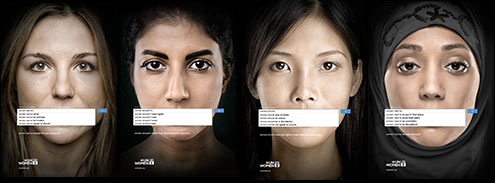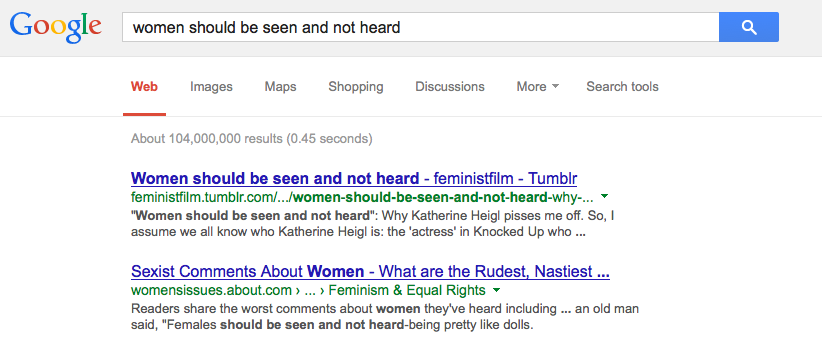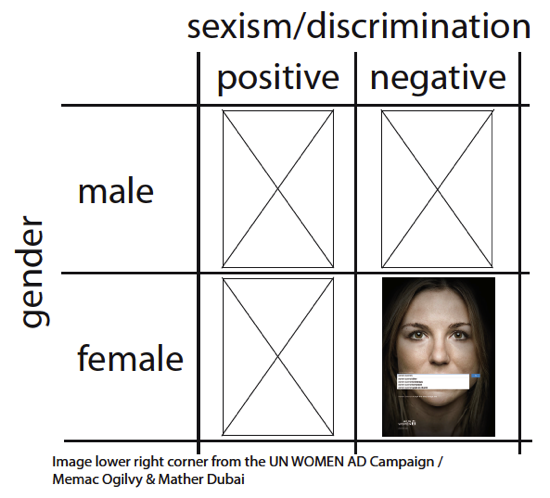Unification of diverse peoples for a purpose and how their diversity is extremely important.
Credo of the Mass Effect Series [not sure where I got this quotation]
When I thought about possible jobs after I graduated from university, I thought about going into advertisement. I love to be creative and I love to apply psychological theories. However, I have a problem with hypocrisy and I like to be loyal (prisoner’s dilemma style), so given that you probably cannot chose your clients, I would have had a problem making ads for products I find unethical.
Don’t get me wrong, the idea of intangible value is incredible, and it can have actual benefits. For example, you really feel different using some products, even if the products itself do not perform better than others. But still, it would have been a problem, so I looked somewhere else.
Recently I noticed that I would even have a problem with ads for ostensibly beneficial purposes. And I guess, that’s where my background in science, analysis and critical thinking comes to play (damn you education! ;-)).

What could be possibly wrong with those ads? Using Google auto-complete (the suggestions you get when you type in a search term in Google, which are “a reflection of the search activity of all web users and the content of web pages indexed by Google“, including your own previous searches if you are logged in) “to reveal the widespread prevalence of sexism and discrimination against women”?
The sexist and discriminating results do not seem to be manufactured, or be the work of a filter bubble affecting the UN Women’s headquarters (what do they search for all day?) — my auto-completion suggestions delivered similar results. Nor do I take issue with reusing an idea that was already applied to other stereotypes, like nationality or race, thus is not really new/creative.
I am also not focusing on the difference between searching for something (e.g., “women should be seen and not heard”) and supporting it. After all, there are a lot of sites criticizing the “prevalence of sexism and discrimination against women” and — seriously, if you hold a strong belief like “women should be seen and not heard”, why challenge that belief and search for it?

No, my main problem is with what you do not see. It is very difficult to notice something that is in front of your eyes when you are given a certain perspective — and these ads provide this perspective skillfully. This is — in many ways — the purpose of ads: to highlight certain aspects and downplay others, to reinforce certain differences by increasing one thing and/or decreasing another. In short: to bias perception.
In this case, the perspective shows women (displayed in professional-grade photos) with the sexist and discriminating auto-complete results over these women’s mouths as “gags”.
So, what is missing when you see the issue of sexism and discrimination from this perspective?
When I’m going to write “What about the men?”, watch your first reaction. Is it negative? If so, because men do have no reason to complain or because they should not complain?
So, here it goes: What about the men? And while were at it, what about the other side of the issue — positive sexism and discrimination?
Sure, this is an ad by UN Women aimed at fighting disadvantages of women, but they claim that:
A series of ads, developed as a creative idea for UN Women by Memac Ogilvy & Mather Dubai, uses genuine Google searches to reveal the widespread prevalence of sexism and discrimination against women [my emphasize]. Based on searches dated 9 March, 2013 the ads expose negative sentiments ranging from stereotyping as well as outright denial of women’s rights. http://www.unwomen.org/en/news/stories/2013/10/women-should-ads
That’s only part of the picture — a certain perspective that is taken — and I find this perspective pretty misleading. Google auto-complete does not only “reveal the widespread prevalence of sexism and discrimination against women”. If anything, it shows “the widespread prevalence of sexism and discrimination” — full stop. For the negative consequences, it’s like looking at the victims of an earthquake, then reporting only female victims and thus assisting only them. But sexism and discrimination is more complicated than that. The shown perspective focuses only on one cell of what — in my opinion — should be seen as a two-by-two table:

And yes, the other cells are populated. For example, for the male-negative cell, Google auto-complete also “reveals” that …
- men cannot be feminists
- men cannot be trusted
- men cannot live without women
- men cannot be tested for hpv
- men need to feel needed
- men need to grow up
- men need to grow up quotes
- men should not pray
- men should not get married
- men should pursue women
- men shouldn’t get married
Similarly, sexism/discrimination can have benefits (“positive” in the table, although the term is somewhat questionable). If you think only about male benefits, how about the women are wonderful effect. Or how easily help is available for women? Differences are hard to notice if you cannot appear as the other gender …
So, by using this specific focus, this ad makes it appear as if only women have negative Google auto-complete results. Yes, it does not claim that this is the case, it merely suggests it. And yes, everything else is neither the focus of the ad, nor of the organization behind it. It’s neither seen as a, nor as their, problem.
But in my perspective, this is a severe bias. In fighting part of the issue, it obscures the larger picture. It does not show that all four fields of the table are filled and that sexism sucks and that the whole table should be chucked away. It also promotes the completely unrealistic view that men have all the benefits and no issues. I’m all for equality, but this view ignores the disadvantages of men, or the sacrifices men made — and make every day — to get these benefits.
It’s a bit like reincarnation believes, really. People who think they have lived former lives usually “remember” themselves as Cleopatra or the like — but never the girl who cleaned her latrines. To put it differently, when thinking about male advantages, many women think about someone with George Clooney’s looks, Rockefeller’s money, and Kennedy’s influence. They never seem to think about the “creep” they shot down, the homeless dude on the street, or the small-time clerk slaving away in an office.
And sure, what’s the point of fantasizing if you can’t be the princess?
And that’s just the problem I see here — fantasies are nice, but reality has consequences. It’s playing “The Princess and the Pea“, while all the guys sleep on the floor, because their mattresses just had to be used elsewhere. Seriously, remove that pea yourself or roll over.
To put it in another way, these ads split the population of humans into two groups by gender lines, they take something that affects both and deal only with one side. They work to reduce the negative effects to that one group only. They don’t fight the overall issue.
Why is the issue not sexism in general, or equality — without the focus to “empower” one gender only? There is no ad for men. While there is http://www.unwomen.org, the male equivalent of http://www.unmen.org gives an “Internal Server Error” (as of 22th of October 2013). Yeah, it has a certain irony. The whole gender/sexism issue is sexist in itself. There is an unequal push, combined with all the problems of organizations dealing with perceived inequality — e.g., money must be used or it gets cut, yet more money is always needed, and you can never win, otherwise you’d be out of a job.
And I think that this cannot work.
Seriously, one half gets benefits ‘for free’, special help, courses, or quotas, and the other half is made to feel guilty, like a perpetrator or criminal without committing a crime? There is a difference between “equality of opportunity” and “equality of outcome”. And I think that everyone should participate in a fair race with equal starting conditions, but nobody should fix the race, e.g., by doping the contestants or knocking them out of the race. Otherwise is negates differences in ability, performance, persistence — and most importantly — it negates personal freedom.
Sure, men usually do not complain — there are social norms, or rather, there is sexism and discrimination at work that prevent most men from complaining — it is evaluated very negatively. But even without audible complains — it breeds resentment.
There is a negative tension, and in-group (we) vs. out-group (them) division. A false view of one group as victims and the others as perpetrators, a feeling of distrust and insecurity — which might just be what some people want. Those who profit by such a division, either financially, politically, in personal influence, or by having their skewed world-view confirmed.
And personally, I have a problem with this world-view, with this view of gender and equality as zero-sum game. Seen this way, both genders lose in the long run. Sexism and discrimination — positive and negative — should be discarded, regarding women and men. We need an open and honest debate about the differences that exist. We need negotiation, each side has benefits and disadvantages to deal with. And sorry, but “United Nations Entity for Gender Equality and the Empowerment of Women” — we are for equality and empower only one side? We strive to achieve balance, but have only one lever to pull? Not helpful.
Gender does not and should not divide people. It should not make us enemies — unless you want to have them in your home — as mothers or fathers, sons or daughters, brothers and sisters.
And frankly, that would not be a world I would like to live in. Do you?
(So, yup, advertisement, would be a problem, so I chose something else … ;-))
Note:
Given the posting about College and Free Speech, I thought about a few of the issues I’m hesitant to speak about. One of those issues is the rampant sexism I see in society today — especially the one you usually do not see. It’s not really the topic of this blog, unless I stretch the topic a little. But so be it, it is important for me. I’ve done it in this posting, I think I wrote an even better posting with this one. But I am still learning about the issue — and seeing everyday life from a different perspective — which is very … eye-opening. So there’s this disclaimer.
Still, I hope it made you think. The issue here (not noticing that the issue is only one cell of a 2×2 table) applies to many different topics, and it is most strikingly revealed if you encounter it in issues you really do not think about. It’s really, really, really hard to escape a given perspective — you feel alienated and strange, but it does give you ideas.
If you like to read more about the topic, I found the YouTube Videos of “Girl Writes What” and “Man Woman Myth” very interesting (quality varies, watch a few before you make up your mind). There is also the website and podcast of “A Voice For Men”. While at the extreme end of the spectrum, they have a couple of interesting postings — and regarding the UN Women poster campaign, they actually beat me to it. That’s the curse (for the individual) and benefit (for mankind) of parallel creativity. No matter that I had the idea independently, they published first. So be it. 😉
Update: 23th/24th of October, 2013: Corrected some spelling errors and made the sentences clearer.